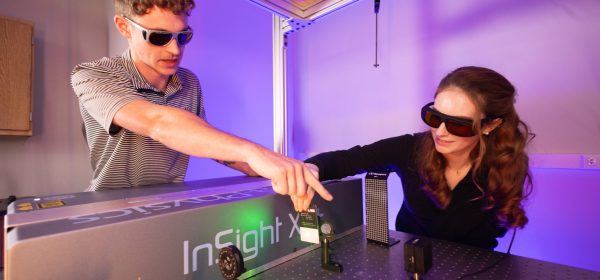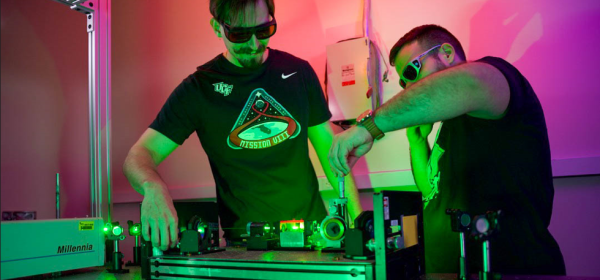Multiple Pathways to Success
CREOL’s MS program is intended for students with a bachelor’s degree in optics, electrical engineering, physics, or closely related fields.
The program offers 3 options: the Photonics concentration, the Optics concentration, and the General Optics and Photonics concentration. All options require 30 graduate credit hours.
Additionally, CREOL offers a fully Online Master’s and an Accelerated Program.
ONLINE MASTER'S
The only fully online program of its kind in Florida, our MS in Optics and Photonics is a flexible degree designed for students with a bachelor’s degree in electrical engineering, physics, mechanical engineering or related fields.
Taught by world-renowned experts at UCF’s College of Optics and Photonics, the program offers students an in-depth curriculum that covers topics including electromagnetics, physical optics, lasers, optoelectronics, fiber optics, imaging, and more.

Accelerated Program
The MS degree can be completed in 12 months by pursuing an accelerated schedule that involves taking 12 credit hours (four courses) in fall, 12 in spring and 6 (two courses) in summer. Due to the accelerated schedule, it is recommended that students carry out a 3-credit hour research report in lieu of a thesis. Students must complete the same program requirements as listed for the Masters and/or concentration programs.
Optics and Photonics MS
The Optics and Photonics MS program requires a minimum of 30 credit hours. Options include nonthesis, thesis, or optional research report. 18 credit hours must be formal optics (OSE prefix) courses.
For nonthesis options, an oral master’s comprehensive examination based on the core courses (OSE 5115 Interference, Diffraction & Coherence OR OSE 5041 Introduction to Wave Optics, OSE 6111 Optical Wave Propagation, and OSE 5525 Laser Engineering OR OSE 6536 Semiconductor Lasers) must be passed as a graduation requirement. Students will be required to take this exam within one semester after completing the all required courses. However, students are advised to take the exam within one semester after completing the two core courses.
General

General Concentration - Thesis Option
Core Courses: 9 Credit Hours
- OSE 6115 – Interference, Diffraction and Coherence OR OSE 5041 Introduction to Wave Optics
- OSE 6111 – Optical Wave Propagation
- OSE 5525 – Laser Engineering OR OSE 6536 Semiconductor Lasers
Elective Courses: 15 Credit Hours
A listing and description of courses offered by the College of Optics and Photonics is found in the Courses section.
Other courses with significant optics content may be accepted towards the Optics (OSE) course work requirement, upon approval by the Associate Dean.
Thesis Research Hours: 6 Credit Hours
- OSE 6971 – Master’s Thesis
An approved thesis committee must be on file PRIOR to enrolling in thesis hours.
General Concentration - Nonthesis Option
Core Courses: 9 Credit Hours
- OSE 6115 – Interference, Diffraction and Coherence OR OSE 5041 Introduction to Wave Optics
- OSE 6111 – Optical Wave Propagation
- OSE 5525 – Laser Engineering OR OSE 6536 Semiconductor Lasers
Elective Courses: 21 Credit Hours
Optional: Students may choose to do a research report which will reduce the elective hours by 3 hours.
- OSE 6909-Research Report
An approved research report committee must be on file PRIOR to enrolling in research report hours.
A listing and description of courses offered by the College of Optics and Photonics is found in the Courses section.
Other courses with significant optics content may be accepted towards the Optics (OSE) course work requirement, upon approval by the Associate Dean.
Optics

Optics Concentration - Thesis Option
Core Courses: 18 Credit Hours
- OSE 6115 – Interference, Diffraction and Coherence OR OSE 5041 Introduction to Wave Optics
- OSE 6111 – Optical Wave Propagation
- OSE 5525 – Laser Engineering OR OSE 6536 Semiconductor Lasers
- OSE 5203 – Geometric Optics & Imaging Systems
- OSE 6211 – Imaging & Optical Systems
- OSE 6265 – Optical Systems Design
Elective Courses: 6 Credit Hours
A listing and description of courses offered by the College of Optics and Photonics is found in the Courses section.
Other courses with significant optics content may be accepted towards the Optics (OSE) course work requirement, upon approval by the Associate Dean.
Thesis Research Hours: 6 Credit Hours
- OSE 6971 – Master’s Thesis
An approved thesis committee must be on file PRIOR to enrolling in thesis hours.
Optics Concentration - Nonthesis Option
Core Courses: 18 Credit Hours
- OSE 6115 – Interference, Diffraction and Coherence OR OSE 5041 Introduction to Wave Optics
- OSE 6111 – Optical Wave Propagation
- OSE 5525 – Laser Engineering OR OSE 6536 Semiconductor Lasers
- OSE 5203 – Geometric Optics & Imaging Systems
- OSE 6211 – Imaging & Optical Systems
- OSE 6265 – Optical Systems Design
Elective Courses: 12 Credit Hours
Optional: Students may choose to do a research report which will reduce the elective hours by 3 hours.
- OSE 6909-Research Report
An approved research report committee must be on file PRIOR to enrolling in research report hours.
A listing and description of courses offered by the College of Optics and Photonics is found in the Courses section.
Other courses with significant optics content may be accepted towards the Optics (OSE) course work requirement, upon approval by the Associate Dean.
Photonics

Photonics Concentration - Thesis Option
Core Courses: 18 Credit Hours
- OSE 6115 – Interference, Diffraction and Coherence OR OSE 5041 Introduction to Wave Optics
- OSE 6111 – Optical Wave Propagation
- OSE 5525 – Laser Engineering OR OSE 6536 Semiconductor Lasers
- OSE 5414 – Fundamentals of Optoelectronic Devices
- OSE 6474 – Optical Communication Systems
- OSE 6421 – Integrated Photonics
Elective Courses: 6 Credit Hours
A listing and description of courses offered by the College of Optics and Photonics is found in the Courses section.
Other courses with significant optics content may be accepted towards the Optics (OSE) course work requirement, upon approval by the Associate Dean.
Thesis Research Hours: 6 Credit Hours
- OSE 6971 – Master’s Thesis
An approved thesis committee must be on file PRIOR to enrolling in thesis hours.
Photonics Concentration - Nonthesis Option
Core Courses: 18 Credit Hours
- OSE 6115 – Interference, Diffraction and Coherence OR OSE 5041 Introduction to Wave Optics
- OSE 6111 – Optical Wave Propagation
- OSE 5525 – Laser Engineering OR OSE 6536 Semiconductor Lasers
- OSE 5414 – Fundamentals of Optoelectronic Devices
- OSE 6474 – Optical Communication Systems
- OSE 6421 – Integrated Photonics
Elective Courses: 12 Credit Hours
Optional: Students may choose to do a research report which will reduce the elective hours by 3 hours.
- OSE 6909-Research Report
An approved research report committee must be on file PRIOR to enrolling in research report hours.
A listing and description of courses offered by the College of Optics and Photonics is found in the Courses section.
Other courses with significant optics content may be accepted towards the Optics (OSE) course work requirement, upon approval by the Associate Dean.
Graduate Catalog
The Current Graduate Catalog contains all degree requirements and university policies regarding graduate education.
See Previous Years Graduate Catalogs.
MS Handbook
The MS handbook provides most details that students need to know to create their program of study and complete all requirements for the MS degree.

